BestReviews is reader-supported and may earn an affiliate commission. Details
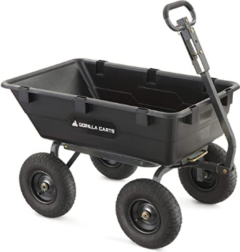
Best for big landscaping and gardening projects, this cart hauls up to 1,200 pounds.
Best for big landscaping and gardening projects, this cart hauls up to 1,200 pounds.
Frame designed for movement. For hauling heavy, bulky items like rocks, wood, and bushes. Dumping mechanism for simple unloading.
A few buyers noted that assembly is simple but usually requires 2 people.
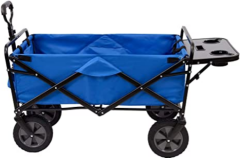
It’s a collapsible, lightweight design that is ideal for light use and occasional projects.
It’s a collapsible, lightweight design that is ideal for light use and occasional projects.
Steel frame supports 150 pounds. Versatile design for tailgating. Cupholders to use at beaches. Folds for compact storage.
Heavier loads may cause the base of the cart to sag.

The dynamic design of this cart lends itself to transporting loads up to 200 pounds.
The dynamic design of this cart lends itself to transporting loads up to 200 pounds.
Offers more than 1 hauling method. Rugged wheels traverse wet and rocky terrain. Well-balanced cart to prevent tipping over.
While versatile, it may not be ideal for hauling larger or bulkier loads.
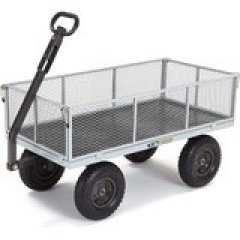
Gorilla Carts is known for top-notch equipment, and this cart is an example of their excellent quality — an all-around great option for garden enthusiasts.
Gorilla Carts is known for top-notch equipment, and this cart is an example of their excellent quality — an all-around great option for garden enthusiasts.
Built for the serious gardener, thanks to the superior steel craftsmanship, capable wheels, and 1,000-pound capacity. Has a durable handle and sides that can be removed to convert it to a flatbed design that's easy to load and unload.
Has the tendency to be a bit "tippy" when empty. Tires have been known to occasionally lose air.
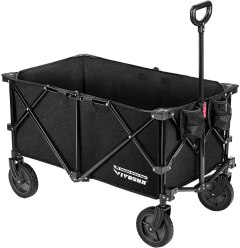
This cart is prepared to carry heavy loads and collapses for more compact storage.
This cart is prepared to carry heavy loads and collapses for more compact storage.
Spacious bed holds up to 176 lbs. The metal frame provides a supportive structure, and the fabric covering is waterproof. Has rotating anti-skid wheels, and an adjustable handle. Comes with 2 attached cup holders.
In some cases, the wheels haven't held up. Not the best option for using on sand.
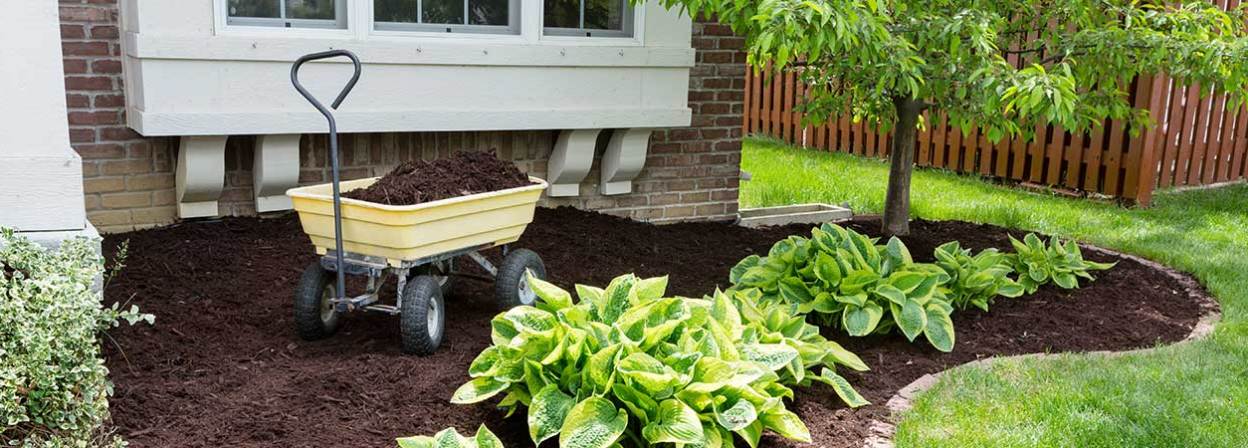
We recommend these products based on an intensive research process that's designed to cut through the noise and find the top products in this space. Guided by experts, we spend hours looking into the factors that matter, to bring you these selections.
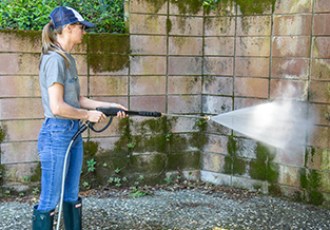
There’s no substitute for a good gardening cart when you want to move plants, dirt, or landscaping materials like pavers around your yard. It is a versatile and labor-saving garden tool.
However, with a quite bewildering range of alternatives available, it can be difficult to decide which is the best gardening cart for your needs. It’s the kind of challenge that BestReviews thrives on, and we’ve been investigating the features of an enormous selection of gardening carts to help you with your decision.
We’ve picked a few favorites that illustrate the wide choice of price and performance options. If you’re close to making a decision, you might well find what you’re looking for right there. For those who would like more detail, we’ve put together the following buying guide. It takes a close look at the various types of gardening carts, discusses their strengths and weaknesses, and answers some of the most common questions about them.

When deciding which is the best gardening cart for your purposes, you want to think about these areas: configuration, materials, capacity, and mobility.
Plastic: The cheapest gardening carts are simple plastic resin buckets on a pair of wheels, usually with a long handle. These are durable, lightweight, easy to clean, and perfect for moving modest amounts of plants or materials around smaller yards. Their only drawback is a tendency to topple over on uneven ground or if not filled carefully.
Fabric: For similar money, you’ll also find small canvas folding models. They’re very compact when not in use, though the carrying capacity isn’t huge, and there’s a risk the canvas sides will tear if you put a sharp implement in there. That said, one of these carts could also be used as a shopping cart or beach cart, so they’re quite versatile.
We suspect most people shopping for a gardening cart are looking for the added capacity of a four-wheeled version. These come as either folding models with fabric sides or solid-steel frames supporting either a polyethylene tub or steel mesh sides.
Fabric: As with two-wheeled gardening carts, folding four-wheeled versions are very compact when stored but lose out to solid versions in load-carrying ability (more on that below). Like their smaller counterparts, there’s also a danger of puncturing or tearing the fabric, although it’s usually quite resilient. Fabric thickness is given as denier (D), and we’d look for 600D or above for the kind of toughness you want for garden use. Also look for fabric that is resistant to UV damage and mold.
Plastic: Carts with polyethylene (often called poly) tubs are very durable, and deeper models can carry loose sand or muddy or wet items without spilling the contents everywhere. They’re also easy to clean with a hose. As with the fabric models, look for UV resistance. The color will probably fade after long exposure outdoors, but the polyethylene won’t disintegrate, which can happen with unprotected plastics.
Steel mesh: Some of the carts with mesh sides have a solid base as a removable option, and with some you can remove the sides completely to provide a flat load bed, which is very useful if you have long or wide items to move around. While loose material or liquids would fall through the holes, it’s possible to use plastic sheeting as a temporary liner if needed.
Convertible: There are a few models, often called utility carts, that can convert from a tub type to a load platform to a dolly, and so on. These offer tremendous flexibility, but they are expensive and somewhat overly complicated if what you want is primarily a gardening cart.
While the size of small, bucket-type gardening carts is usually given in gallons, larger models have a weight rating in pounds. Always assume that this is an absolute maximum. It’s also a good idea to carry less weight if you’re dragging the cart over rocky ground, which puts extra stress on the frame and wheels.
The frame of a four-wheeled folding gardening cart isn’t as sturdy as that on a solid model, but many can comfortably handle 100 pounds or so. If you’re having difficulty picturing how much that is, a standard bag of compost weighs around 40 pounds. Fixed, steel-framed models have a capacity of anywhere from 300 to 1,000 pounds.
Of course, it’s not all about maximum load. Often you have light but bulky items to transport. That being the case, it’s equally important to check the external dimensions of the gardening cart you’re considering.
Gardening carts come in a variety of different wheel and tire combinations. Lightweight carts used on hard surfaces do fine with solid plastic wheels, although those with rubber tires are less jarring and quieter. However, they do tend to dig into soft ground. That’s when you want pneumatic tires to help spread the load and reduce damage to a lawn or other surfaces. They are also better over rocky ground because they help absorb the bumps.
Most people would struggle to move the 1,000 pound load that some of these gardening carts can handle, so heavy-duty models are usually designed to be towed (behind a lawn tractor, for example). Top models have convertible handles, giving you the option of hauling by hand or attaching it to a vehicle.

Gardening gloves: Pine Tree Tools Working Gloves
Good gardening gloves protect your hands and improve your grip on tools. You also need enough sensitivity to be able to handle delicate plants. These gloves combine breathable bamboo with rubberized palms so they’re comfortable in all conditions yet durable too. They’re even touchscreen-friendly!
Garden tool belt: Truly Garden Tool Belt
Carry all your tools and other bits and pieces around with this high-quality garden tool belt. It’s made from tough 600D nylon that shrugs off damp and dirt and offers great convenience and versatility with lots of different pockets. Adjustability runs from a 26- to 48-inch waist, and it can double as a DIY tool belt.
It’s hard to beat a folding garden cart for compact storage when not in use but check that the load capacity is enough for your needs.
Inexpensive: The cheapest gardening carts we looked at are light-duty, two-wheeled models that cost between $35 and $40. These are ideal for small gardens.
Mid-range: Larger four-wheeled gardening carts start at around $60 for a folding model with a weigh rating of 150 pounds and go up to $100 or so for a solid-frame cart that holds 600 pounds. Carts in this bracket offer excellent value and will probably suit the majority of buyers.
Expensive: Heavy-duty gardening carts that can handle 1,000 pounds start at about $150. Multipurpose cart/dolly models can be as much as $300, but they do offer outstanding flexibility.

Garden carts offer excellent stability, but they aren’t foolproof. These straightforward tips can help you avoid accidents or injuries.

A. That’s a tough question. Some would probably say that a wheelbarrow is a type of garden cart, and there are certainly a number of two-wheeled garden carts that are not unlike wheelbarrows. The big benefit with a wheelbarrow is the better maneuverability offered by the single front wheel, though lifting a full wheelbarrow can be difficult, and there’s a risk of it tipping over.
The main difference comes with four-wheeled gardening carts, which generally have greater load-hauling capacities (particularly those that can be hooked up to a lawn tractor). They also provide greater stability.
There’s no easy answer that suits all gardeners. You’ll have to think carefully about what you need. If you have a large garden, you might want to consider getting a small wheelbarrow for weeding and light-duty tasks and a four-wheeled garden cart for larger jobs.
A. It varies. Many two-wheeled garden carts come ready to use, but four-wheeled models often need minor frame assembly and the wheels attached. It’s not a complicated job, and it frequently takes less than 30 minutes. Some manufacturers provide online videos to help you.
A. Yes. Depending on the model, you’ll be able to get a replacement inner tube, new tire, or even a wheel with the tire already fitted so all you have to do is inflate it. Just be careful to check the size carefully (it’s usually marked on the sidewall on pneumatic tires). If your garden cart has solid wheels, there are also many alternatives available, often from the same retailer who sold you the cart.
Get emails you’ll love.
Learn about the products you’re wondering if you should buy and get advice on using your latest purchases.
